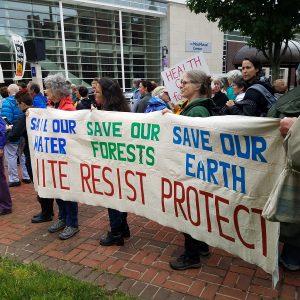I didn’t plan on going to a grassroots activist rally that day, June 4, 2018. But my days as Muslim Student Adviser offer many different opportunities, so I wasn’t surprised. Director of Religious & Spiritual Life and College Chaplain Rev. Matilda Cantwell and I travelled to Springfield to attend a rally sponsored by the Poor People’s Campaign, since supporting causes dedicated to the dignity and wellbeing of marginalized groups is part of the mission of our Center.
 We met up with the group of protesters in the central grassy area of Court Street across from City Hall. There were a couple hundred people of all backgrounds with homemade signs and spirited attitudes. Taking turns at the podium were a local Springfield minister, the director of Arise for Social Justice, a young rap artist, and a series of mother-activists deploring the mold in the public school buildings where their children face the devastating effects of asthma. They charged the city with negligence in enforcing the state sanitary code that governs Springfield’s aging housing stock. According to literature distributed to the crowd, “Springfield has the highest number of asthma-related emergency room visits in the nation,” ranking number one “as the most challenging city for asthma in the United States.” Speakers lamented about poor families subjected to asthma triggers such as rodent droppings, mold, and cockroaches.
We met up with the group of protesters in the central grassy area of Court Street across from City Hall. There were a couple hundred people of all backgrounds with homemade signs and spirited attitudes. Taking turns at the podium were a local Springfield minister, the director of Arise for Social Justice, a young rap artist, and a series of mother-activists deploring the mold in the public school buildings where their children face the devastating effects of asthma. They charged the city with negligence in enforcing the state sanitary code that governs Springfield’s aging housing stock. According to literature distributed to the crowd, “Springfield has the highest number of asthma-related emergency room visits in the nation,” ranking number one “as the most challenging city for asthma in the United States.” Speakers lamented about poor families subjected to asthma triggers such as rodent droppings, mold, and cockroaches.
At the rally, Matilda held conversations with colleagues she knew from Northampton and the Hilltowns who came to be in solidarity with the protesters, and I too greeted fellow activists I knew from Springfield. However, I found myself wondering where all the people of color were, in a city whose public school system is comprised of over 80% black and brown children. The predominant race of the crowd was white. They were mostly older, and clearly committed to this worthy cause, but removed, to some degree, from those most affected. Allyship and witness are crucial, and we are seeing more and more intersectionality in social movements. However, the fact remains that many people who live in poor communities and many people of color specifically, apply their physical, mental and financial resources to just attend to their families. By virtue of being poor, many work low wage jobs which may not allow for the flexibility to attend a daytime rally. One of the clergy who spoke, a trans black man, passionately encouraged the protesters to reach out to poor people—it was, after all “The Poor People’s Campaign.”
We started walking to the state building up the street, ending up in front of the Western Massachusetts Office of the Governor State Office Building on Dwight Street. As the crowd chanted the “The people, the people rule,” drivers honked their horns in support. I was glad we were representing Smith’s Center for Religious and Spiritual Life, lifting our voices and sounding the alarm.
Looking back, I hope we somehow made a difference that day, raising consciousness about the concerns of poor people and how we can create change at the local level. Two questions still remain. Will those we were fighting for come forward in larger numbers to demand justice? And will those of us invested in the movement be able to help more of the affected people make their voices heard? By the same token, we must also remember that we are all affected, to greater and lesser degrees, and many of us here at Smith—students, staff, and faculty—come from low income backgrounds, are currently poor, and have fought poverty, racism, and oppression, and will continue to do so.
The Poor People’s Campaign is a “call for moral revival” based in the principle that “our deepest religious and constitutional values […] demand justice for all.” In the words of the original founder of the Poor People’s Campaign, The Rev. Dr. Martin Luther King, Jr.,
“Injustice anywhere is a threat to justice everywhere. We are caught in an inescapable network of mutuality, tied in a single garment of destiny. Whatever affects one directly, affects all indirectly.”
To learn more about the Poor People’s Campaign, visit their website or follow them on Facebook.
